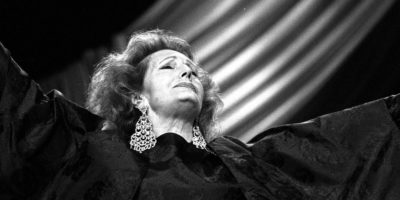
Education campaigner Malala Yousafzai sends a personal message of support to the young activists at the Youth Summit 2015 by Jessica Lea/DFID – Wikimedia Commons
15 Most Famous Speeches by Women
In the recent past, women have risen up to use their voices to impact change all around them. From championing women’s and girls’ rights to speaking about social justice to motivational speeches, women’s voices are now heard all around the world. Most of these speeches by women have been immortalized and are used as a hallmark of change in this day and age.
These speeches made by the women we’ve highlighted have sparked further conversations that have had a rippling effect on the issues raised in these speeches. Other speeches have radically caused a shift in the societal perspective on some issues, and others have caused revolutions. In this article, we take a deep look into 15 of the most famous speeches by women.
1. “Ain’t I a Woman?” by Sojourner Truth (1851)
“Ain’t I a Woman?” is a speech, delivered extemporaneously, by Sojourner Truth, born into slavery in New York State. Sometime after gaining her freedom in 1827, she became a well-known anti-slavery speaker. Her speech was delivered at the Women’s Convention in Akron, Ohio, in 1851, and did not originally have a title.
She delivered her speech, “Ain’t I a Woman?”, at the Women’s Rights Convention in 1851. Truth questions the treatment of white women compared to Black women. She says that she has worked and birthed many children, making her as much a woman as anyone else. There is no official published version of her speech; many rewritings of it were published anywhere from one month to 12 years after it was spoken.
2. “The Danger of a Single Story” by Chimamanda Ngozi Adichie (2009)

Chimamanda Ngozi Adichie by Carlos Figueroa – Wikimedia Commons
Chimamanda Ngozi Adichie’s “The Danger of a Single Story” Ted Talk, in July 2009, explores the negative influences that a “single story” can have and identifies the root of these stories. Adichie asserts that media and literature available to the public often only tell one story, which causes people to generalize and make assumptions about groups of people.
Adichie argues that single stories often originate from simple misunderstandings or one’s lack of knowledge of others, but that these stories can also have a malicious intent to suppress other groups of people due to prejudice. Here are 5 Books by Chimamanda Ngozi Adichie You Should Read Now.
3. “The Solitude of Self” by Elizabeth Cady Stanton (1892)
In 1892, Stanton delivered the speech that became known as The Solitude of Self three different times in as many days, twice to Congressional committees and once as her final address to the NAWSA. She considered it her best speech, and many others agreed.
In pursuit of her lifelong quest to overturn the belief that women were lesser beings than men and therefore not suited for independence, Stanton said in this speech that women must develop themselves, acquiring an education and nourishing an inner strength, a belief in themselves. Self-sovereignty was the essential element in a woman’s life, not her role as daughter, wife or mother. Stanton said, “no matter how much women prefer to lean, to be protected and supported, nor how much men desire to have them do so, they must make the voyage of life alone.
4. “Quality Education for All” by Malala Yousafzai (2013)

Education campaigner Malala Yousafzai sends a personal message of support to the young activists at the Youth Summit 2015 by Jessica Lea/DFID – Wikimedia Commons
On 12 July 2013, Yousafzai’s 16th birthday, she spoke at the UN to call for worldwide access to education. The UN dubbed the event Malala Day. Yousafzai wore one of Benazir Bhutto’s shawls to the UN. It was her first public speech since the attack, leading the first-ever Youth Takeover of the UN, with an audience of over 500 young education advocates from around the world.
Yousafzai received several standing ovations. Ban Ki-moon, who also spoke at the session, described her as our hero. Words from the speech were used as lyrics for Speak Out, a song by Kate Whitley commissioned by BBC Radio 3 and broadcast on International Women’s Day 2017.
5. “Women’s Rights to the Suffrage” by Susan B. Anthony (1873)
The trial, United States v. Susan B. Anthony, began on June 17, 1873, and was closely followed by the national press. On the second day of the trial, Hunt asked Anthony if she had anything to say. She responded with “the most famous speech in the history of the agitation for woman suffrage”, according to Ann D. Gordon, a historian of the women’s movement.
Repeatedly ignoring the judge’s order to stop talking and sit down, she protested what she called this high-handed outrage upon my citizen’s rights, saying, you have trampled underfoot every vital principle of our government. My natural rights, my civil rights, my political rights, and my judicial rights, are all alike ignored. She castigated Justice Hunt for denying her a trial by jury but said that even if he had allowed the jury to discuss the case, she still would have been denied a trial by a jury of her peers because women were not allowed to be jurors. Read more interesting facts about Susan B. Anthony.
6. “Our Struggle” by Winnie Mandela (1986)

Winnie Mandela by John Mathew Smith – Wikimedia Commons
During a speech in Munsieville on 13 April 1986, Mandela endorsed the practice of necklacing burning people alive using rubber tyres filled with petrol by saying: “With our boxes of matches and our necklaces we shall liberate this country.”
In the context of the global struggle for the release of political prisoners in our country, our movement took a deliberate decision to profile Nelson Mandela as the representative personality of these prisoners, and therefore to use his personal political biography, including the persecution of his wife, Winnie Mandela, dramatically to present to the world and the South African community the brutality of the apartheid system
7. “Commencement Speech at Barnard College” by Sheryl Sandberg (2011)
In May 2011, she gave the Commencement Address at the Barnard College graduation ceremony. “Rolling back the patriarchy can’t happen with women alone. For the #MeToo movement to reach its goals, men need to be partners in it. But too often, when the urge to fight sexism does hit men in business, they’re already in positions of power, usually alongside lots of other men.”
Sheryl Sandberg challenged this norm in her commencement speech today at the Massachusetts Institute of Technology, promising the graduates that “you can impact the workplace from the day you enter it.”
8. “You Have a Purpose” by Oprah Winfrey (2018)

Oprah in Miami on her “The Life You Want” tour, October 2014 – Wikimedia Commons
Oprah Winfrey accepted the Golden Globes’ Cecil B. DeMille Award for lifetime achievement with an acceptance speech that began as a personal reflection and ended as a call to action to everyone who attended the event.
An excerpt from her speech read, “What I know for sure is that speaking your truth is the most powerful tool we all have. And I’m especially proud and inspired by all the women who have felt strong enough and empowered enough to speak up and share their personal stories. Each of us in this room is celebrated because of the stories that we tell.” Read more amazing facts about Oprah Winfrey.
9. “The Power of Vulnerability” by Brené Brown (2010)
Brown’s TEDx talk from Houston in 2010, The Power of Vulnerability, is one of the five most-viewed TED talks. Its popularity shifted her work from relative obscurity in academia into the mainstream spotlight. The talk summarizes a decade of Brown’s research on shame, framing her weightiest discoveries in self-deprecating and personal terms.
Reggie Ugwu for The New York Times said that this event gave the world a new star of social psychology. She went on to follow this popular TED talk with another titled Listening to Shame in 2012. In the second talk, she talks about how her life has changed since the first talk and explains the connection between shame and vulnerability, building on the thesis of her first TED talk.
10. “The Future is Female” by Hillary Clinton (1995)

Former Secretary of State Hillary Clinton speaking with supporters at a campaign rally by Gage Skidmore – Wikimedia Commons
In a September 1995 speech before the Fourth World Conference on Women in Beijing, Clinton argued forcefully against practices that abused women around the world and in the People’s Republic of China itself.
She declared, “it is no longer acceptable to discuss women’s rights as separate from human rights”. Delegates from over 180 countries heard her declare, If there is one message that echoes forth from this conference, let it be that human rights are women’s rights and women’s rights are human rights, once and for all. In delivering these remarks, Clinton resisted both internal administration and Chinese pressure to soften her remarks. The speech became a key moment in the empowerment of women and years later women around the world would recite Clinton’s key phrases.
11. “The Givenness of Things” by Marilynne Robinson (2015)
In The Givenness of Things, the incomparable Marilynne Robinson delivers an impassioned critique of our contemporary society while arguing it is a necessary call for us to study our cultural heritage in search of both wisdom and guidance and to offer grace to each other.
The spirit of our times can appear to be one of joyless urgency. As a culture, we have become less interested in the exploration of the glorious mind, and more interested in creating and mastering technologies that will yield material well-being.
12. “Noble Peace Prize Lecture” by Wangari Maathai (2004)

Nobel Laureate Professor Wangari Maathai with Barack Obama in Nairobi, Kenya by Fredrick Onyango – Wikimedia Commons
Wangari Maathai was awarded the 2004 Nobel Peace Prize for her contribution to sustainable development, democracy and peace. In this excerpt from her Nobel Peace Prize lecture in 2004, Wangari Maathai explains the work of the Green Belt Movement, the organization that she founded in 1977.
Through the Green Belt Movement, thousands of ordinary citizens were mobilized and empowered to take action and effect change. They learned to overcome fear and a sense of helplessness and moved to defend democratic rights. Read more about the 50 Most Famous Black Women in History.
13. “Speech to the Troops at Tilbury” by Queen Elizabeth I (1588)
The Speech to the Troops at Tilbury was delivered on 9 August Old Style 1588 by Queen Elizabeth I of England to the land forces earlier assembled at Tilbury in Essex in preparation for repelling the expected invasion by the Spanish Armada. On the day of the speech, the Queen left her bodyguard before Tilbury Fort and went among her subjects with an escort of six men.
Before the speech, the Armada had been driven from the Strait of Dover in the Battle of Gravelines eleven days earlier and had by then rounded Scotland on its way home, but troops were still held at ready in case the Spanish army of Alexander Farnese, Duke of Parma, might yet attempt to invade from Dunkirk; two days later they were discharged.
14. “On the Pulse of Morning” by Maya Angelou (1993)

Maya Angelou speech for Barack Obama campaign 2008 by Talbot Troy – Wikimedia Commons
“On the Pulse of Morning” is a poem by writer and poet Maya Angelou that she read at the first inauguration of President Bill Clinton on January 20, 1993. With her public recitation, Angelou became the second poet in history to read a poem at a presidential inauguration, and the first African American and woman,
Angelou’s audio recording of the poem won the 1994 Grammy Award in the “Best Spoken Word” category, resulting in more fame and recognition for her previous works, and broadening her appeal.
15. “We Shall Overcome” by Fannie Lou Hamer (1964)
Civil rights activist Fannie Lou Hamer co-founded the Mississippi Freedom Democratic Party and travelled to the Democratic National Convention in 1964 to demand that the MFDP’s delegates, rather than the all-white Mississippi Democratic Party delegates, be seated in the convention. Although unsuccessful, her moving testimony was broadcast on national television and drew further attention to the plight of African Americans in the South.
An excerpt from her speech read, “All of this is on account we want to register, to become first-class citizens, and if the freedom Democratic Party is not seated now, I question America, is this America, the land of the free and the home of the brave where we have to sleep with our telephones off of the hooks because our lives are threatened daily because we want to live as decent human beings, in America?”
Read more on 110 Most Influential Women of All Time.
Planning a trip to Paris ? Get ready !
These are Amazon’s best-selling travel products that you may need for coming to Paris.
Bookstore
- The best travel book : Rick Steves – Paris 2023 – Learn more here
- Fodor’s Paris 2024 – Learn more here
Travel Gear
- Venture Pal Lightweight Backpack – Learn more here
- Samsonite Winfield 2 28″ Luggage – Learn more here
- Swig Savvy’s Stainless Steel Insulated Water Bottle – Learn more here
Check Amazon’s best-seller list for the most popular travel accessories. We sometimes read this list just to find out what new travel products people are buying.









